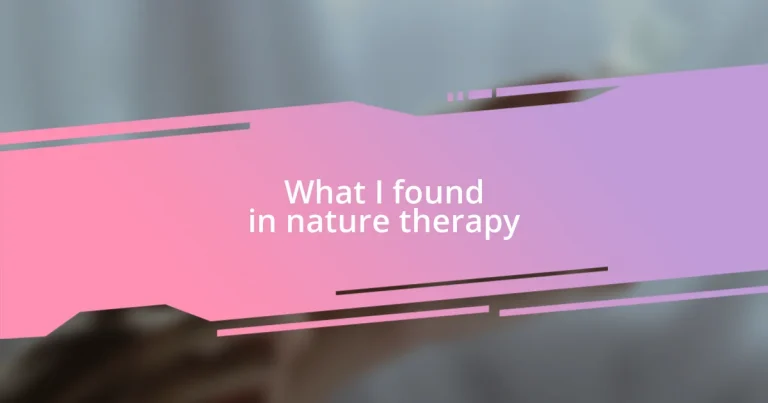Key takeaways:
- Nature therapy significantly enhances mental and physical wellbeing by reducing anxiety, boosting mood, and fostering clarity and creativity through outdoor engagement.
- Activities such as mindful walking, forest bathing, and nature journaling cultivate a deeper connection to nature and promote personal reflection and emotional resilience.
- Incorporating nature therapy into daily routines can be simple—regular nature breaks, sensory engagement, and reflecting on experiences enrich one’s appreciation for nature and personal growth.
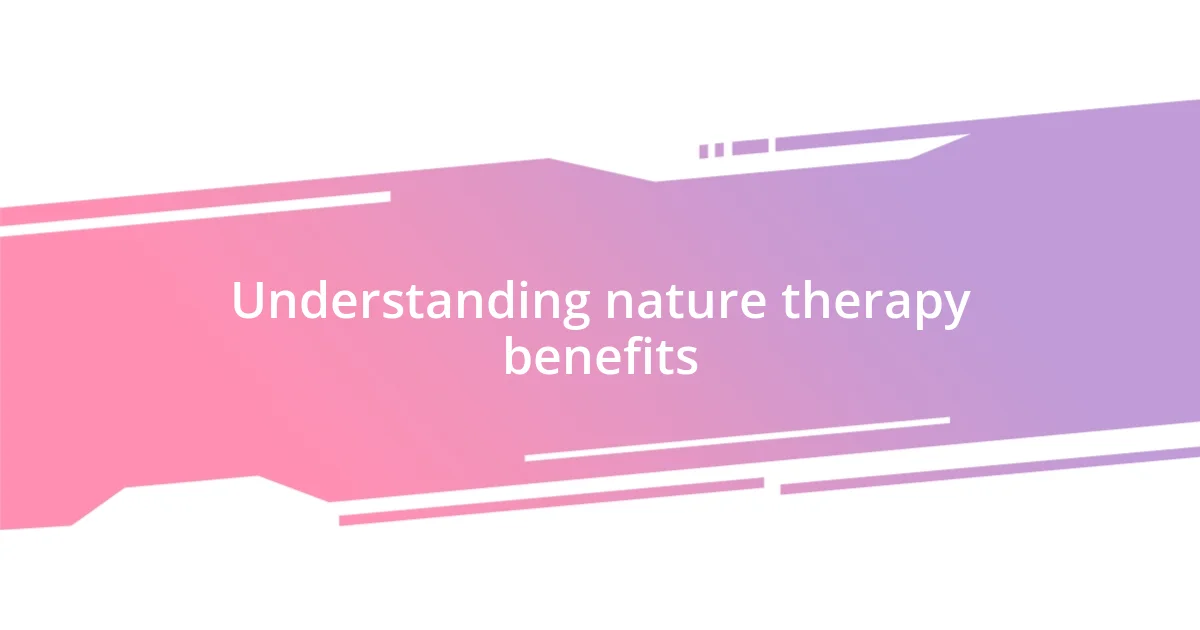
Understanding nature therapy benefits
Nature therapy offers an incredible range of benefits that can positively transform our mental and physical wellbeing. I remember a time when I felt overwhelmed by stress; spending an afternoon in the woods, surrounded by towering trees and the gentle sound of rustling leaves, made me realize how profoundly nature could soothe my mind. It’s amazing how just being outdoors can reduce anxiety and boost mood—don’t you feel more at peace when you breathe in that fresh, crisp air?
Engagement with nature also fosters a sense of connection, not only to the environment but to oneself. I often find that when I immerse myself in natural settings, my thoughts become clearer, and I gain valuable insight into my feelings and challenges. Have you ever noticed how time spent in nature can lead to moments of reflection? That silent connection with the Earth seems to spark creativity and encourage a deeper understanding of our personal journeys.
Moreover, physical benefits abound when we embrace nature therapy. For instance, my morning walks through local parks have turned into a routine that keeps me both physically active and mentally sharp. The simple act of walking on uneven terrain enhances balance and strength—have you ever considered how a hike can feel both invigorating and meditative? Nature therapy isn’t just relaxing; it actively contributes to our overall health, reinforcing the mind-body connection.
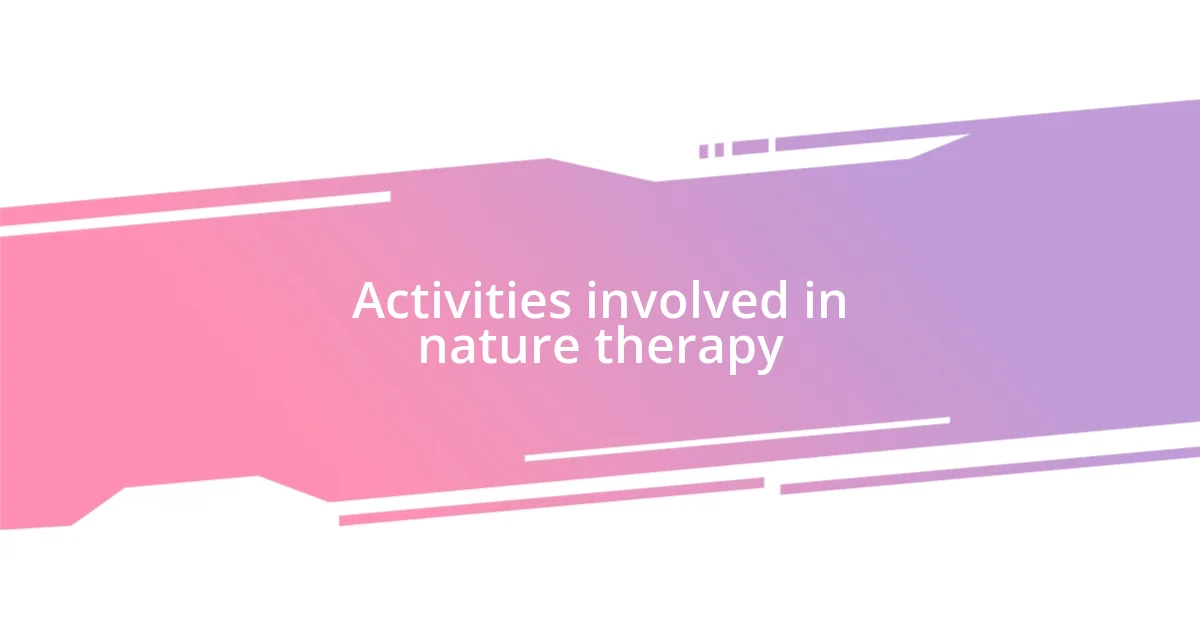
Activities involved in nature therapy
Engaging in nature therapy typically involves a variety of activities that facilitate a deep connection with the natural world. For me, there’s nothing quite like the feeling of grounding myself by walking barefoot on soft grass or taking a moment to lay down and watch the clouds drift by. It brings a sense of calmness that you just can’t find inside four walls. Each activity serves as a unique opportunity to explore our surroundings and nurture our well-being.
Here are some popular activities involved in nature therapy:
- Mindful walking or hiking: This invites you to focus on your surroundings, paying attention to the sounds, sights, and scents of nature.
- Forest bathing (Shinrin-yoku): Immersing yourself in a forest setting, which has been shown to lower stress and enhance mood.
- Nature journaling: Capturing thoughts, feelings, or sketches inspired by your natural environment can be a therapeutic outlet.
- Gardening: Digging in the soil and nurturing plants offers a profound sense of connection and accomplishment.
- Creative expressions: Using natural materials to create art or craft facilitates a more profound creative exploration while in nature.
Each of these activities has the potential to awaken a sense of wonder and gratitude. I remember one summer afternoon sitting quietly by a river, sketching the patterns in the water and letting my mind drift. It was like the worries of my day faded away, and I could just be. Nature provides this canvas to not only create but to reconnect with our innermost selves.

Personal experiences in nature therapy
Spending time in nature therapy has reshaped my perspective on life. One vivid memory stands out—a chilly morning when I decided to hike alone up a local mountain. The crisp air filled my lungs, and with each step, the weight of my worries seemed to lighten. As I reached the summit, the breathtaking view unfolded below me, and I felt a surge of gratitude wash over me. It was a moment of clarity; I realized how crucial it is to pause and appreciate the beauty around us. Have you ever felt such a rush of inspiration from just standing in the midst of nature?
Connecting with the environment also deepens our emotional resilience. I distinctly remember a rainy Saturday afternoon spent in my backyard, just listening to the raindrops dancing on leaves. Instead of feeling gloomy, I discovered a profound sense of peace while sipping my tea, enveloped by the sounds and scents of nature. This experience reminded me that embracing the elements—even the rain—can foster a sense of acceptance and inner calm. Isn’t it fascinating how nature has a way of teaching us to welcome every bit of life, including the stormy moments?
My experiences in nature therapy often encourage vulnerability. There was a time when I found myself wandering along a quiet beach, grappling with personal struggles. As I walked along the shoreline, I picked up shells and stones, each symbolizing a story from my past. With every wave that lapped at my feet, I felt a gentle release of those burdens. Nature, in its simplicity, invites reflection and healing. Have you ever found yourself transformed by simply being present in the moment?
| Experience | Emotional Insight |
|---|---|
| Hiking to a mountain summit | Finding gratitude and clarity |
| Listening to rain in my backyard | Embracing peace and acceptance |
| Walking along a quiet beach | Healing through reflection and release |
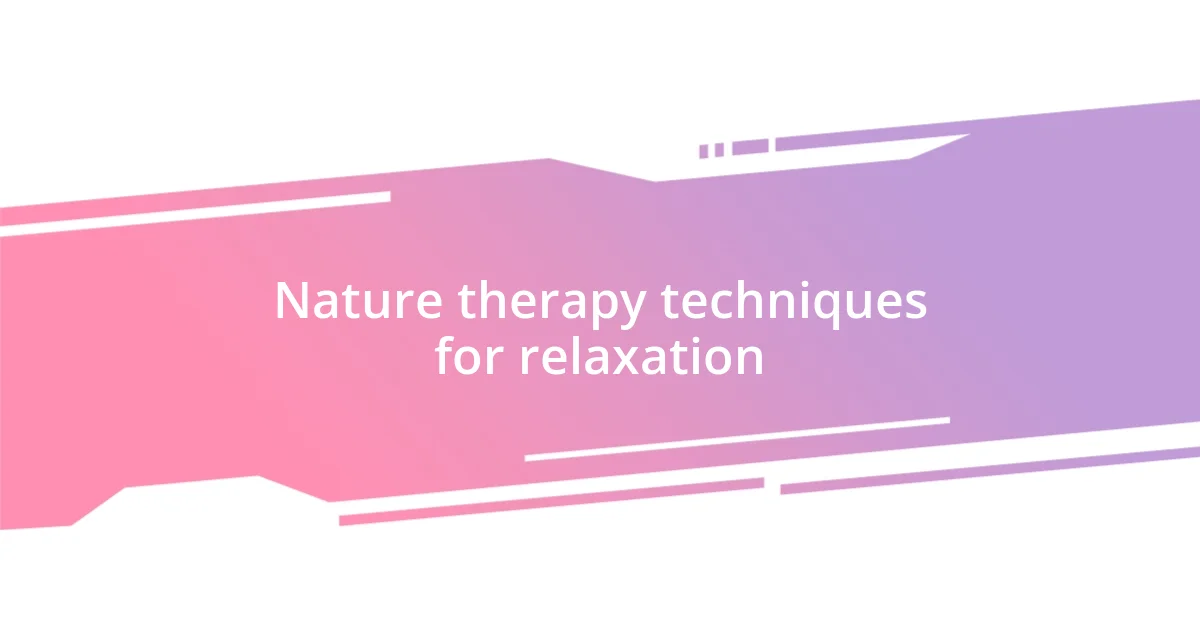
Nature therapy techniques for relaxation
Engaging in nature therapy techniques for relaxation has been truly transformative for me. One of my favorites is creating a sensory garden. I recall spending a Saturday afternoon selecting plants not just for their beauty, but for their textures and scents. As I dug my hands into the soil, I felt my stress melt away, replaced by a deep sense of connection to the earth. Have you ever experienced the simple joy of nurturing something from the ground up?
Another technique I cherish is simply observing wildlife. I often find myself seated on my porch, sipping tea, and watching birds flit about. It’s amazing how just pausing to appreciate the antics of these little creatures can ground me in the moment. I’ve learned that even a few minutes of observation can shift my mindset entirely. Have you found that connecting with nature’s inhabitants can lift your spirits as much as it does for me?
Meditative practices outdoors also hold a special place in my heart. I remember one peaceful morning when I settled under an old oak tree, closing my eyes and focusing on my breath. The gentle rustle of leaves and the chirping of nearby crickets created a soothing symphony. It reminded me of the importance of silence in a world filled with noise. Have you ever felt that profound stillness awaken clarity in your thoughts? Nature has an incredible way of facilitating inner peace, reminding me that relaxation comes naturally when we allow ourselves to truly be present.
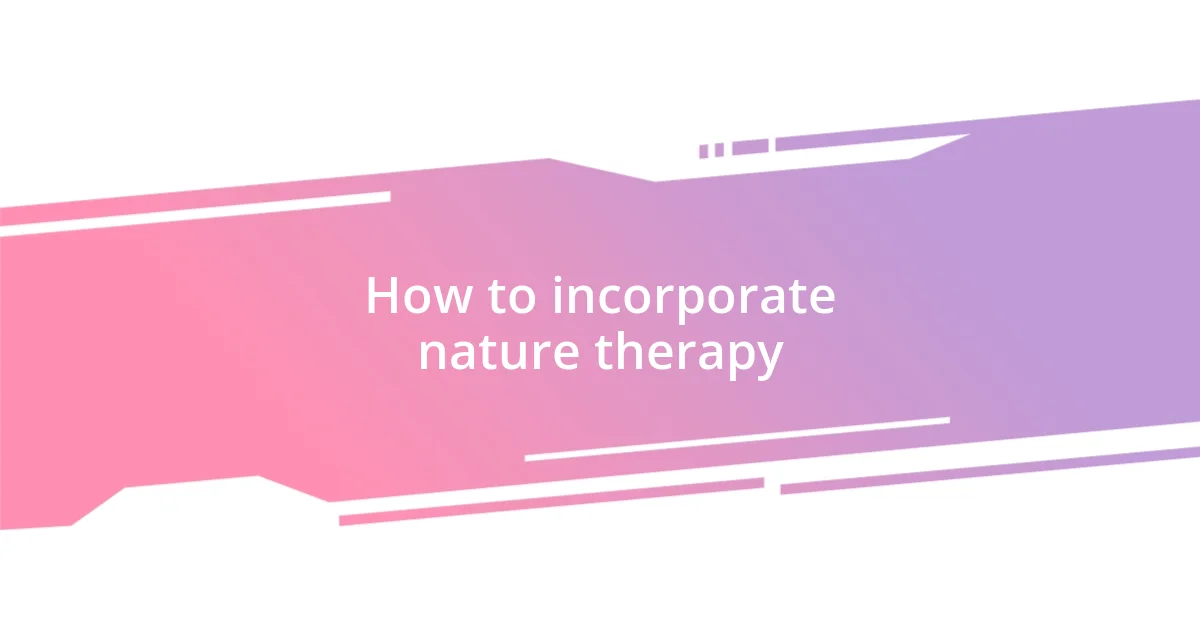
How to incorporate nature therapy
Incorporating nature therapy into your routine doesn’t require drastic changes. One simple approach I love is taking “nature breaks” during my busy day. Whether it’s stepping outside for a quick walk in a nearby park or just sitting on my balcony to watch the clouds pass, I find these small moments refresh my mind. Have you ever noticed how even a brief encounter with the outdoors can instantly lift your spirits?
Another effective method is to engage your senses. I recall a time I spent an afternoon blindfolded in my backyard, letting my other senses take the lead. Feeling the sun’s warmth on my skin, listening to the rustle of the grass, and breathing in the fragrant flowers opened my awareness in an incredible way. It’s amazing how much richness lies in simply experiencing nature without the usual distractions. Have you considered how deeply we can connect with our environment by tuning into our senses?
Lastly, I’ve found that journaling in nature can be incredibly nourishing for the soul. One particular evening, I took my notebook to a local lake and jotted down my thoughts while watching the sun set. The golden hues reflecting on the water felt like a gentle reminder to reflect on my day. Have you ever tried letting nature inspire your writing? It’s a tool I cherish, as it not only helps in processing emotions but also deepens my connection to the world around me.
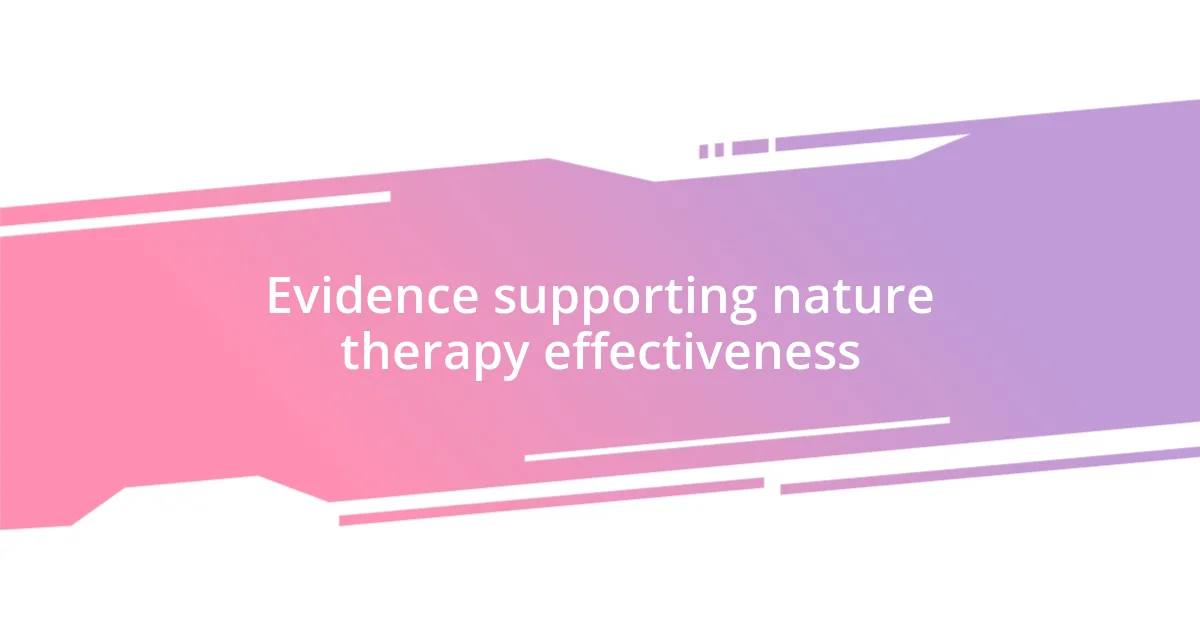
Evidence supporting nature therapy effectiveness
Nature therapy has garnered substantial scientific backing, highlighting its benefits for mental well-being. Research shows that time spent in green spaces can significantly reduce stress levels and enhance mood. Personally, after a long week, I find that a Saturday hike among towering trees not only clears my mind but genuinely lifts my spirits. Have you ever noticed how the vibrant colors and fresh air can rejuvenate your soul?
Empirical evidence further suggests that nature exposure can improve cognitive function. In my experience, after working on a project in a park, I often return home with renewed focus and creativity. It’s fascinating how the calming sounds of nature serve as a reset button for my mind. Have you ever experienced that clarity after stepping outside?
Moreover, clinical studies indicate that nature therapy may aid in reducing symptoms of anxiety and depression. Reflecting on a time when I felt overwhelmed, taking a simple walk in the woods allowed me to breathe deeply and regain my equilibrium. It’s remarkable how the gentle embrace of nature nurtures our emotional health. Have you thought about how just a small dose of the outdoors can shift your perspective in difficult times?
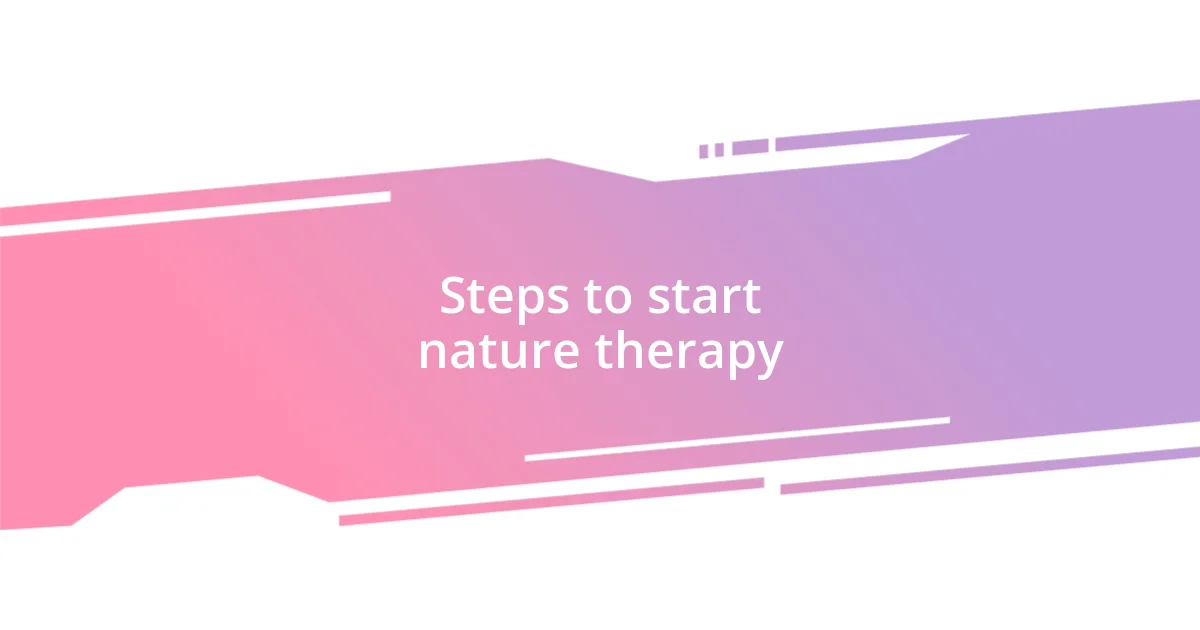
Steps to start nature therapy
Starting nature therapy can be straightforward and deeply personal. For me, it began with scheduling specific times to immerse myself in nature. I remember setting aside time every Sunday afternoon for a “nature date” with myself—finding a new trail or visiting a serene garden. What if you set a regular appointment with nature? The consistency really helped me create a habit of appreciation for the outdoors.
Another practical step is to choose activities that resonate with you. Personally, I enjoy birdwatching because it blends stillness with excitement. I vividly recall spotting a magnificent blue jay that stirred such joy within me. Have you ever found a hobby in nature that ignited your curiosity? Engaging in such activities can make nature therapy feel both fun and fulfilling.
It’s also essential to reflect on your experiences after spending time outdoors. When I come back from a nature outing, I take a few minutes to process how I feel. I often jot down my thoughts or emotions—capturing that essence of connection with the world around me. Have you thought about how reflecting on your feelings could deepen your appreciation for nature? This practice has enriched my awareness and made my nature therapy feel like a journey rather than just a moment.












